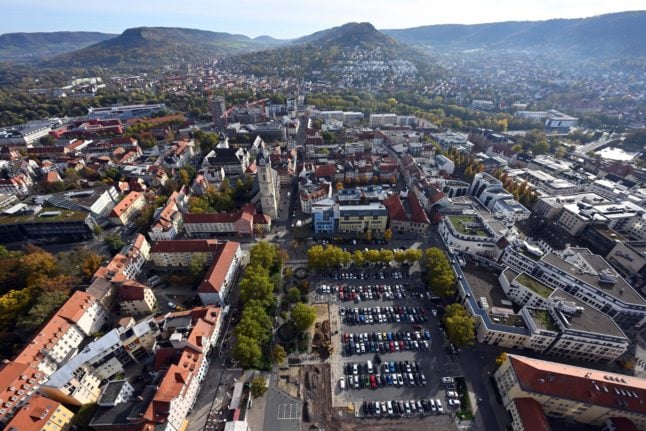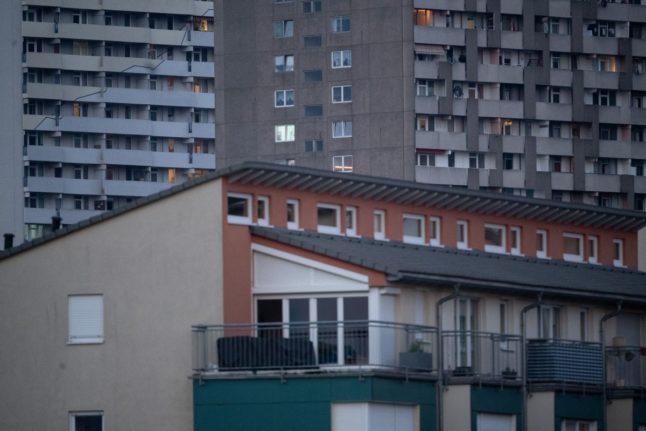Overall, housing prices in Germany have become enormously more expensive between 2016 and 2022. The average price increase in all 400 German regions is 77 percent – from €1,757 to €3,075 per square metre.
That’s according to the Postbank’s recently published Housing Atlas, which is calculated annually by the Hamburg Institute of International Economics (HWWI).
We look at where purchases prices have shot up the highest – often over 100 percent – and the one district in all of Germany where they actually went down.
READ ALSO: Why Germany’s housing crisis is expected to drag on
Where in Germany has seen the largest increase?
Anyone who purchased a property in Bayreuth six years ago can consider themselves lucky: the birthplace of Richard Wagner saw purchase prices for existing properties rise by an average of 270 percent from 2016 to 2022, by far the highest increase in any other German city or district.
In Bayreuth the price per square metre rose from an average of €1,023 to €3,785 in six years.
This puts the northern Bavarian city at the top of the scoreboard by a wide margin. The location that saw the second highest price increase, however, is a mere 50km away. In the district of Wunsiedel in the Fichtelgebirge, prices rose by an average of 163 percent over the six year timeframe.
Third place goes to Uckermark in Brandenburg with 151 percent, followed by two more Bavarian cities, Bamberg (142 percent) and Passau (140 percent).

More expensive that Berlin: its suburbs
It’s well-known that the capital has seen housing prices skyrocket in recent years, with a 82 percent price increase between 2016 and 2022. But its neighbouring districts have been hit even harder by the price explosion.
The highest increases have been in Havelland (107 percent), Oberhavel (112 percent), Barnim (114 percent), Märkisch-Oderland (127 percent), Oder-Spree (123 percent), Dahme-Spreewald (112 percent), Teltow-Fläming (104 percent) and Potsdam-Mittelmark (122 percent).
READ ALSO: EXPLAINED: How Berlin rents and property prices soared in 2022
Other over-100 percent price increases
Germany-wide, the cities which have seen an over-100 percent increase in price are Oldenburg (127 percent), Kassel (110 percent), Karlsruhe (114 percent) and, not surprisingly, Munich (108 percent).
READ ALSO: Housing: How did it get so expensive to live in Munich?
The Bavarian capital takes the lead as the most expensive city in the country. Per square metre, housing now costs €9,734.
Other areas where prices have shot up are coastal regions on the North Sea and Baltic Sea – mostly due to holiday properties – and the surrounding areas of major cities such as Cologne and Düsseldorf in North Rhine-Westphalia.
Otherwise districts with very high and very low price increases are spread across the country. In some cases they even sit next to each other.
The district of Celle in Lower Saxony, for example, has seen costs go up by 121 percent, while prices next door in the district of Gifhorn have risen only very slowly at 51 percent.
Where are prices the most stable?
The eastern German state of Thuringia has arguably been the least affected by price increases: nine out of 22 regions are among those with the lowest price increases in all of Germany and 16 out of 22 regions have below-average increases.

Only the state’s Kyffhäuserkreis with an increase 133 percent stands out. The district of Greiz, on the other hand, is the only one in the whole of Germany where prices for existing properties have actually fallen since 2016.
From once €1,000 per square metre, it went down between 2016 to 2022 by 2.3 percent to €977. The Saale-Orla district is also one of the more stable in the country, with only a 9.4 percent increase.
More surprisingly though, the more popular region of northern Bavaria has also seen lower-than-average increases. While the city of Bamberg itself has seen price rises, the district of Bamberg only saw prices go up by 18 percent.
Among the large cities, the largest prices increases were seen in Ingolstadt (34 percent), Wolfsburg (40 percent) and Freiburg (45 percent) saw the smallest price increases.
READ ALSO: REVEALED: The German regions where property prices are falling and rising the most
How much will prices go up in the future?
These prices increases are only a moderately good indicator for the future, according to an analysis in Focus Online. By 2035, the HWWI expect the highest price increases in cities such as Munich and Potsdam, which were already above average in the past.
HWWI said they expected prices to fall slightly on average until the middle of the next decade. However, the experts previously predicted this five years ago – and so far the exact opposite has occurred.




 Please whitelist us to continue reading.
Please whitelist us to continue reading.
Member comments